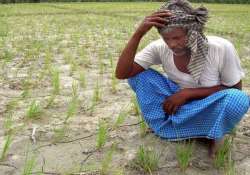Drought-hit Maharashtra sees 40% increase in farmer suicides
New Delhi: Maharashtra has recorded 40% rise in farmer suicides in the last seven months due to successive natural calamities and scarcity situation.The state reported 975 suicides by farmers between January to July 2014. The

New Delhi: Maharashtra has recorded 40% rise in farmer suicides in the last seven months due to successive natural calamities and scarcity situation.
The state reported 975 suicides by farmers between January to July 2014. The figure rose to a steep 1,373 between August 2014, when the drought set in, and February 2015.
According to Times of India, the region of Marathwada, which was among those worst hit by the drought, has seen the sharpest increase in suicides by farmers during the same period. The suicides here have risen by 85%. Every single village in the region was declared drought-affected.
Even large land-holders are committing suicide in Georai, which is part of Aurangabad's Beed district and is located close to the Jayakwadi dam.
Many farmers lost their Kharif and Rabi crops and across the state sowing for the rabi winter crop was down by 40%.
Officials say the state is facing a potent combination of three types of drought. "The poor rain points to meterological drought, ground water depletion signals hydrological drought. And the drop in yield means we have agricultural drought as well," says Aurangabad divisional commissioner Umakant Dangat. He attributes the changing weather patterns to climate change.
"The farmer is facing low yield because of the drought. Add to this the high price of cultivation and low price for the crop. How is he expected to survive?" asks farming activist Vijay Jawandia.
The minimum cost of production for a quintal of cotton is Rs 5,200. The market price for a quintal last year was Rs 5,000, which means the farmer could break even. Today the price is only Rs 3,600-3,800, Jawandia points out.
Bizarre policies like encouraging the water-guzzling sugarcane crop in this drought-prone zone have added to the water stress, experts say. Marathwada has 2.4 lakh hectares under the crop and boasts of 61 sugar factories. Sugarcane occupies five per cent of the state's land but commands 60 per cent of its irrigation water.
There are limited irrigational facilities in Marathwada and of the 10 lakh hectares of irrigation potential created, just three lakh hectares are utilized, according to the divisional commissioner.
The poor management of irrigation facilities has resulted in the rampant exploitation of ground-water, as farmers turn to borewells and tubewells. The majority of talukas in the region are reporting a dip in ground water levels compared to the last five years, escalating the water crisis in the region.